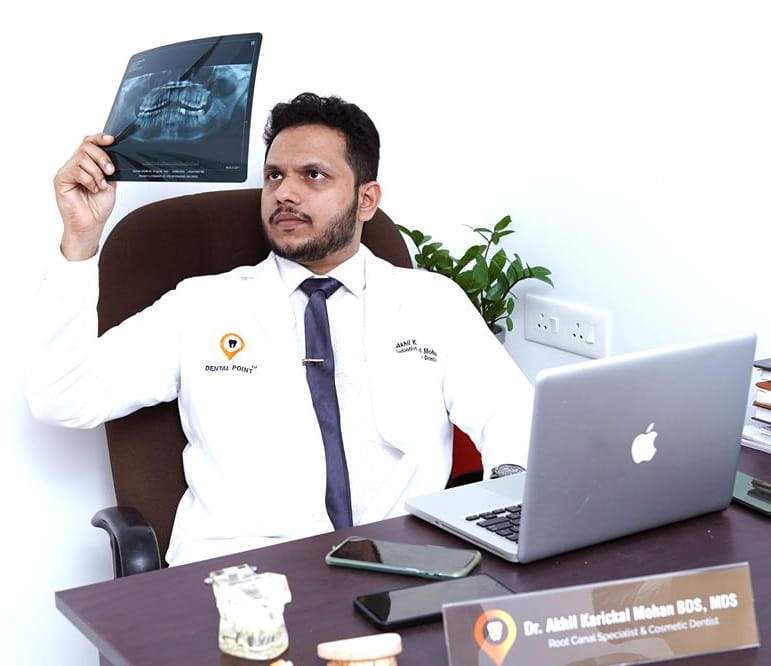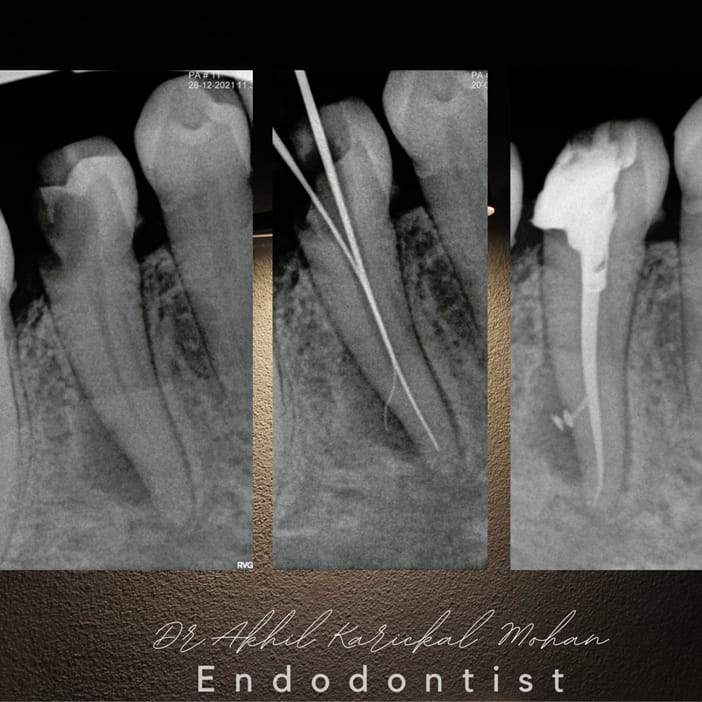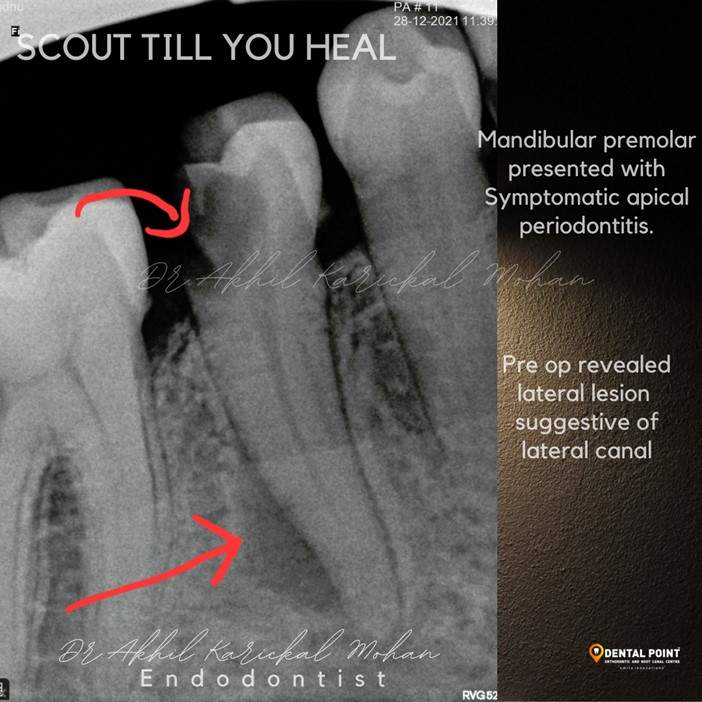



Root Canals
Sometimes bacteria enters the pulp of a tooth and causes an infection. When this occurs, root canal therapy is necessary to save the tooth. During this procedure, the infected pulp is removed and the tooth is sealed to prevent reinfection.
Root Canal Treatment Kochi
Root canal treatment is a dental procedure that relieves pain caused by an infected or abscessed tooth. During the root canal process, the inflamed pulp is removed. The surfaces inside the tooth are then cleaned and disinfected, and a filling is placed to seal the space. It usually requires a full coverage or partial crowns.

When is a root canal needed?
Root canal therapy is necessary when oral bacteria invade the pulp inside of your tooth. This usually happens when a cavity is left untreated for a long time. It can also occur if your tooth becomes cracked or damaged due to trauma. Long standing trauma will result in teeth discoloration.
What are some symptoms that indicate you may need root canal treatment?
Most patients are unaware that they need a root canal. Signs you need a root canal include:
- Tooth pain that doesn’t go away: Many dental problems can cause tooth pain. If you have pain deep in your tooth, you may need root canal therapy. Discomfort may also radiate to your jaw, face or other teeth.
- Sensitivity to heat and cold: If your tooth hurts when you drink hot coffee or eat ice cream, it could mean that you need root canal treatment. This is especially true if the pain lingers for more than a few seconds.
- Swollen gums: When a tooth is infected, pus can collect in the area. This can lead to puffy, swollen or tender gums.
- Pimple on the gums: You may develop a pimple or boil on the gums. Pus from the infected tooth may drain from the pimple, causing an unpleasant taste or smell.
- Swollen jaw: Sometimes pus doesn’t drain from the site. As a result, your jaw may become visibly swollen.
- Tooth discoloration: When the pulp of a tooth becomes infected, it can cause your tooth to look darker. This occurs because of remnants of blood inside the tooth.
- Pain when pressure is applied: If you have pain when you eat or touch your tooth, it could mean the nerves around the pulp are damaged.
- A chipped or cracked tooth: If you’ve cracked a tooth in an accident, when playing sports or even by biting down on something hard, bacteria can reach all the way into the tooth pulp.
- Loose tooth: An infected tooth may feel looser. This is because the pus from the infected pulp can soften the bone that supports the tooth.
How common is root canal therapy?
According to a recent study, more than 15 million root canals are completed each year in India and on an average an endodontist performs 25 Root canal treatments a month
How common is root canal therapy?
According to a recent study, more than 15 million root canals are completed each year in India and on an average an endodontist performs 25 Root canal treatments a month
PROCEDURE DETAILS
How should I prepare for root canal treatment?
Before beginning your root canal, ask all your queries regarding the treatment. Here are a few things you can do to prepare for your root canal treatment:
- Take all medications as prescribed: A few days prior to your session, especially if there is a significant amount of infection present, you might be prescribed antibiotics or anti-inflammatory drugs.
- Don’t smoke: The healing process of your body is slowed down by tobacco products. A few days before to your root canal appointment, try to cut down smoking.
- Eat a healthy meal: Since the local anesthesia used during root canal therapy will make your mouth numb for a few hours, it’s a good idea to eat before your appointment.
How long does a root canal take?
Depending on the amount of infection in your tooth, root canal therapy may require one or two appointments. On average, a root canal takes about 30 to 60 minutes to complete. If you are having treatment on a teeth with calcified canals or with extra root, Root canal specialist itself can take a little longer to complete the procedure successfully.
What happens during the root canal process?
Your doctor will take dental X-rays of the afflicted tooth before starting the root canal procedure. This enables the degree of the damage to be evaluated and confirms that root canal therapy is the best course of action. The following steps will be carried out during your root canal procedure:
- First, local anesthesia is given to numb the infected tooth and the surrounding gums. There are also medications used in dentistry to help you relax, such as nitrous oxide, oral sedatives or intravenous (IV) sedation. Your healthcare provider may recommend sedation if you struggle with dental anxiety.
- Dental dam placement. Before beginning root canal treatment, a small rubber dam is placed over the area. This isolates the tooth and keeps it dry during the procedure.
- Access hole. Next, a small opening is made in the crown of the tooth to access the pulp.
- Pulp removal. Tiny dental instruments are used to remove the nerves, blood vessels and tissues inside the tooth.
- Shaping the canals. Once the pulp is removed, the pulp chamber and root canals are cleaned, disinfected and shaped.
- Filling the canals. The empty canals are then filled with a flexible, rubbery dental material called gutta-percha.
- Sealing the tooth. Next, a temporary dental filling is placed to seal the tooth and prevent bacteria from re-entering.
- Placing the final restoration. In most cases, you’ll need a dental crown to protect the treated tooth and restore your bite. Crowns are custom-made, and fabrication usually takes two to three weeks. When your crown is ready, the temporary filling is removed and the permanent crown is placed. In some instances, you may be able to receive a crown during the same appointment.
Do root canals hurt?
We are known for using modern equipment and techniques aimed at patient comfort and happiness. We have one of the best root canal specialist in Kochi who has experience over 10 years treating patients with anxiety and fear. He keeps you calm by casual talk and numb your gums and soft tissues with topical anesthesia. Special way of injecting local anesthesia is used , many don’t even realize that they are numbed. We wait until you are completely numb and we ensure it before we start the procedure. Many people worry about experiencing dental pain during root canal therapy. Dr.Akhil’s vast experience in the field of Endodontics plays a pivotal role in gentle instrumentation of root canals and complete disinfection of the canal space. He is also trained in treating International patients from different parts of the world thus handling all kinds of complexities associated with Root canal treatment. This very procedure eliminates the infection’s source, there will be immediate pain relief. Don’t hesitate to call the dentists office if there is severe pain.
What should I expect after a root canal?
Even though you shouldn’t experience severe pain following a root canal, you can experience sensitivity for the first few days. With the use of anti-inflammatory medicines or pain killers these symptoms can be successfully handled as they are normal. Most discomfort disappear after one to two weeks.
Who should perform my root canal procedure?
Root canal treatment is done completed by an endodontist (a root canal specialist) or an experienced general dentist. General dentists can often treat teeth near the front of the mouth since they have fewer roots. If you need root canal therapy on a tooth with multiple roots or if your case is complex then you may be referred to an endodontist. Specialist doctors can handle any complexities of root canal anatomy and offers better results to the treatment. Endodontists have elaborate knowledge about anatomy of teeth and they can treat a failed root canal treatment successfully.
What are the advantages of having a root canal procedure?
There are several benefits to choosing root canal therapy. This treatment can:
- Save the tooth from removal
- Relieves your pain
- Reduces swelling or sensitivity
- Help save the natural teeth
- Ease the symptoms associated with an infected tooth.
- Reduce the risk of jawbone damage.
- Prevent infection from spreading to other teeth.
Are root canals safe?
Root canals are considered safe and effective. This procedure boasts impressive success rates of up to 98%.
WHAT HAPPENS IF I DON’T TREAT THE TOOTH?

One of the issues of leaving the tooth untreated (upper red arrow depicting decay almost reaching the vital pulp deep inside) will be extreme pain and suffering. Pus and abscesses develop when the blood vessels and nerves inside the tooth become severely infected in the absence of therapy (lower red arrow) Because of the buildup of the infection, an abscess is formed (a swelling filled with pus) at the end of the root. When an abscess is severe enough, the neck, face, or eye may expand as a result. You might need to visit the hospital right away in these conditions. Find out a good endodontist before it worsens. Another issue with not treating the tooth is bone loss around the tooth’s roots.
What are common failed root canal symptoms?
Root canal complications can occur in some cases. This is especially true if your tooth is too damaged for this type of treatment. Failed root canal symptoms include:
- Pain.
- Tooth mobility
- Pus or drainage near the gums
- Tooth discoloration.
- Pimple or boil on the gums.
- Sinus problems.
- Swollen gums
What if my root canal fails?
If your root canal fails, your dentist will explore your options with you. In some cases, root canal retreatment may be possible. Endodontist can give a 2nd chance to the tooth to live. They would analyse the reasons for failure after proper clinical and radiographical examination and explain you advantages and disadvantages of going through a re treatment. Our endodontist at Dental Point has a good track record of many successful retreatments. Dr.Akhil does a systematic evaluation and consideration of the best treatment option in a particular case, a treatment recommendation may then be given in favour or against tooth retention.
What are the alternatives to root canal treatment?
The only alternative to root canal therapy is tooth removal. Even though it’s best to save natural teeth whenever possible, extraction may be necessary when is tooth is non restorable.
If you’re not a good candidate for root canal treatment, the tooth can be extracted and replaced with a dental implant, dental bridge or partial denture. To learn more about root canal vs extraction, call our office at 9400920555
RECOVERY and beyond
How long does root canal recovery take?
Usually root canal recovery time lasts less than a week. Mild discomfort may be present for a few days, but this can be managed with medication. If you have severe pain or discomfort that lasts longer than a week, you can contact the dental office and share your concerns.
Can you drive after a root canal?
It depends Usually it is done with local anesthesia which doesn’t affect driving.
People who choose oral sedation or IV sedation will need a friend or family member to drive them.
Can I eat after a root canal?
Yes. But it’s better to wait until the numbness wears off. The effects of the anesthesia usually last 4-5 hours. Care should be taken not to bite your lips or cheeks when its numb. Soft foods are preferred for few days if there is pain or tenderness. You can have porridge, oats, mashed potatoes or yogurt. Solid foods can be taken when comfort level increases
You should avoid biting or chewing with the treated tooth. Try to chew on the other side of your mouth until your permanent dental restoration is in place.
Can you smoke after a root canal?
It isn’t recommended. Smoking interferes with healing and increases the likelihood that you’ll need more dental work in the future.
When can I resume work, school or other activities?
Most of the time, people who have had root canal therapy can go back to work or school the next day. Root canal treatment is not very invasive procedure to think about taking a day off. Most of the people go back to work after the root canal treatment.
What are some root canal aftercare tips?
Keeping the region clean is crucial after root canal therapy. Use an antibacterial mouthwash to stave off bacteria in addition to regular brushing and flossing. Avoid chewing on the treated tooth until the permanent crown is in place if a temporary filling is still in place and you haven’t yet gotten your permanent crown.
WHEN TO CALL THE DOCTOR
A note from DENTAL POINT
It can be scary to have gum swelling or tooth ache. Thankfully, root canal treatment can eliminate illness at its source, allowing you to recover fast. Call your doctor as soon as you think you may have an infected or abscessed tooth. Early intervention can stop an infection from spreading and ease your pain, allowing you to return to your normal routine.
BOOK AN APPOINTMENT
Address
Metro Pillar 779, GCDA Junction, Sahodaran Ayyappan Rd, near Medilab, Giringar Housing Colony, Kadavanthra, Kochi, Ernakulam, Kerala 682020